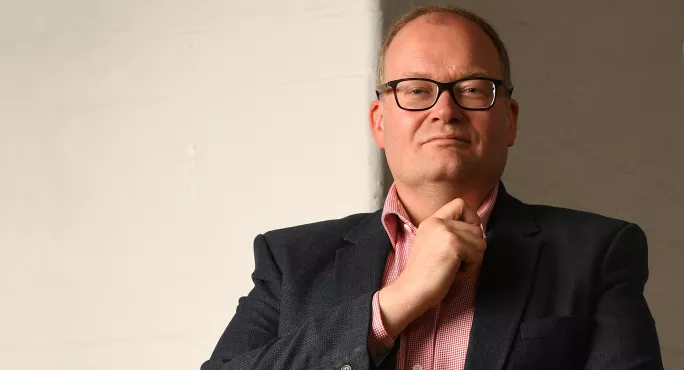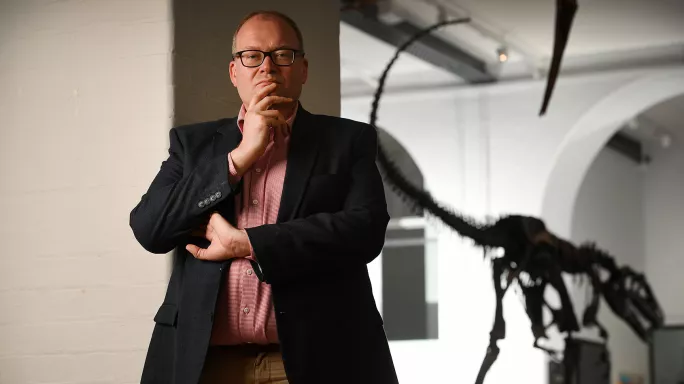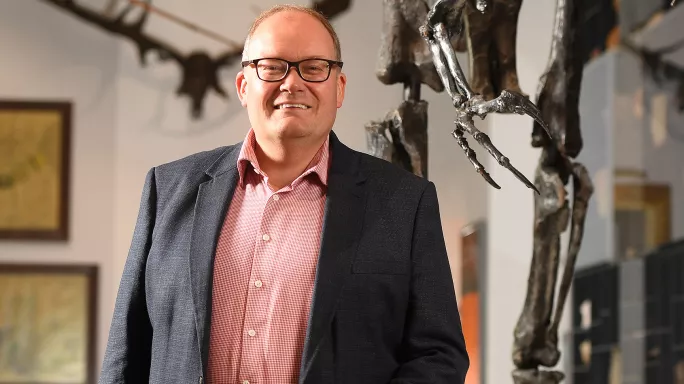- Home
- The Tes profile: Darren Henley, Arts Council chief
The Tes profile: Darren Henley, Arts Council chief

Darren Henley is the man in charge of doling out £1.64 billion over the next four years to support artists, theatres and musicians in England – and he doesn’t want children to be left out.
Henley, chief executive of Arts Council England (ACE), has already made headlines with a commitment – backed up by £170 million – to boost arts opportunities outside London.
Now, he is increasingly speaking out about the key role that schools play in providing those opportunities.
“I believe, very strongly, that there are three pillars of a great education: numeracy, literacy and creativity,” he says. “I think you need all three and all three are as important as each other.”
And he adds that while a creative approach can be taken to all subjects, a rigorous arts education offers something unique.
“A sound cultural education to me is about gaining knowledge of the canon, it’s about gaining the skills to draw or to write, it’s about having critical faculties – understanding why you like or dislike something,” he says.
“But crucially it is about being able to create new things as well, whether it be creative writing, music, dance, acting or visual arts because that’s how we as a society progress – because we come up with new things.”
The EBacc and the arts
Until 2011, Mr Henley, then managing director of Classic FM, was perhaps only known in schools for the books he had written for children about music (if you wanted to know which composer threw a plate of beef stew at a waiter, then you could find out in Henley’s The Incredible Story of Classic Music for Children).
Then came two government commissioned independent reviews – of music education and of cultural education (broadly defined by Henley as including: archaeology, architecture and the built environment, archives, craft, dance, design, digital arts, drama and theatre, film and cinemas, galleries, heritage, libraries, literature, live performance, museums, music, poetry and the visual arts).
The latter review took a sideswipe at the newly-introduced English Baccalaureate GCSE league table measure, saying that ministers should consider “a sixth grouping of subjects” which could include art and design, dance, drama, design technology, film studies and music.
But the review stopped short of making this a formal recommendation. Today the EBacc still has no arts component, and concern about its impact on arts education is growing.

Henley’s support for creativity in schools – and his belief that schools cannot act alone - has only become stronger since then.
In his 2016 book The Arts Dividend, Henley takes a very clear stance: “We should now be creating an education framework that encourages more young people to study subjects such as art and design, dance, drama and music at GCSE alongside English, maths, science and languages,” he states. “We must have an education system that opens the doors of possibility to our young people, rather than shutting down their options too early by forcing them to take a narrow set up subject choices that excludes these important aspects of cultural education.”
The Arts Dividend marked Henley’s reflections at the end of his first year in the top job at the Arts Council, a year spent evenly divided between London and the rest of the country. The council has light, modern offices in Bloomsbury, but Henley spends a lot of time at provincial railway stations (“I always seem to be passing through Doncaster,” he muses) travelling to scores of galleries, museums and concert halls. The approach gives him a valuable insight into the impact of the arts, through hearing hundreds of people’s own stories.
'Going to Hull was brilliant'
Henley, 45, has always loved listening. He grew up in Kent, and at about 10 decided he wanted to work in radio. He first used tape recorders to make his own radio programmes in his bedroom. At 13, he won a scholarship to go to St Edmund’s School in Canterbury and got work experience on the local radio station Invicta FM at age 16. He "never really left" Invicta once his work experience was up – spending weekends and school holidays working on travel bulletins and news reading.
Meanwhile he was studying for A levels in English, Politics and Business Studies, and applied to Hull to study politics. He admits at the time he didn’t even know where Hull was, but he had noticed that his A-level textbooks were written by an Hull University academic, Philip Norton (now Lord Norton of Louth).
“I went to the open day and by fluke, I got interviewed by Philip Norton," Henley recalls. "He asked me why I had chosen Hull. I said: ‘I know this sounds sycophantic, but you wrote all the textbooks’. He lent forward and said ‘Mr Henley, if I may say so, that is a very, very good answer’. And I got in. For me, going to Hull was a brilliant thing to do…it gave me the best possible view of world.”

His prodigious work ethic was already in evidence. While still studying, he landed a job as an overnight reporter at Classic FM in London where he worked from 2pm to midnight on Sundays, slept on the sofa in the chief executive’s office (unknown to the chief executive) and then caught the early train back to Hull on Monday morning for lectures.
On leaving Hull, he joined Classic FM as a reporter – and worked his way up until, by 2006, he was managing director.
Then, after 22 years, he left. His move to the Arts Council in 2014 was welcomed by commentator Norman Lebrecht, who wrote in the Spectator that Henley would prove a “culture shock” to the “Guardianistas”.
“He has no truck with metropolitan elites or on-message mantras. He will apply a sound business sense to the ACE structure and a shrewd eye for cost/benefit ratios to the priorities for subsidy,” Lebrecht wrote.
While classical music could be, and often is, viewed as one of the more elite arts – Henley has never been elitist. In the music review, he recommended that the government funded In Harmony projects to set up children’s classical musical groups in some of the most deprived areas of the country. Ministers acted accordingly. And in the following cultural education review he explicitly pointed out that those children whose parents could afford to pay for private tuition were more likely to take up music, dance and drama.
Amid all the serious points, Henley took time to underline something of great importance to children – that cultural education is fun. “And we should never be ashamed of that”.
Telling stories with a database approach
Henley’s belief in education shows in his own prodigious learning, he is currently studying for a professional doctorate – which will be his fourth degree.
“I suppose my mid-life crisis is that I’m doing some degrees,” he jokes.
He has written more than 30 books on the arts, and has a great talent for listening and telling stories. But he knows that winning people around will take more than stories, however heartwarming.
While the Arts Council’s first chairman was the economist, John Maynard Keynes, Henley has now decided that the council should employ an economist for the first time – to help make the case for arts funding.
“We have to be better at gathering data and being able to tell the stories with a databased approach,” he told a Commons committee earlier this year. And the Arts Council England has also just begun, in conjunction with De Montfort University, a 25-year project to provide solid evidence of the impact of providing rich arts experiences to children through from birth to adulthood.
He believes in aiming high: “I believe that every child should have opportunity to be socially mobile enough to become someone who runs the country in the future,” Henley says.

He is, of course, drawing on his own creativity to make the argument for the importance of the arts in schools and in life. And they are driven by a recognition that if the argument is lost – some children will be more affected than others.
“There is no magic wand that can be waved to make the world change overnight for children from our most disadvantaged communities,” Henley writes in his latest book Creativity: Why it matters. “It’s by no means easy to put in place the conditions needed to help these young people unlock the opportunities that will enable them to fulfil their potential. But that doesn’t make it any less worth doing. It just means that we need to recognise that it will take time for the investment to come good.”
Henley knows the importance of balancing budgets but also sees the value of looking beyond monetary rewards. There may be no magic wand for children, but they do have a champion.
Darren Henley CV
Education: St Edmund’s School, Canterbury (1986 -1991), University of Hull, BA Politics (1991-1994). University of South Wales, MSc Management (2017), University of Buckingham, MA history of art (2018)
Career:
1992 – 2014: Classic FM
1992: Started as a weekend and overnight newsreader, while still at university. Then promoted through various roles becoming managing director in 2006.
2014: Chief executive, Arts Council England
National roles:
2007-2010: Chaired Music Manifesto Partnership
2011: Authored independent review of music education in England
2012: Authored independent review of cultural education in England
Honours:
2005: Nominated for Grammy award for audio book The Story of Classical Music
2013: OBE
2013: Sir Charles Grove prize, Making Music
2015: President’s Medal, British Academy
Author:
Has written or co-written over 30 books on the arts or classical music, including: The Arts Dividend: Why Investment in Culture Pays, and Creativity: Why it matters.
Register with Tes and you can read two free articles every month plus you'll have access to our range of award-winning newsletters.
Keep reading with our special offer!
You’ve reached your limit of free articles this month.
- Unlimited access to all Tes magazine content
- Save your favourite articles and gift them to your colleagues
- Exclusive subscriber-only stories
- Over 200,000 archived articles
- Unlimited access to all Tes magazine content
- Save your favourite articles and gift them to your colleagues
- Exclusive subscriber-only stories
- Over 200,000 archived articles



